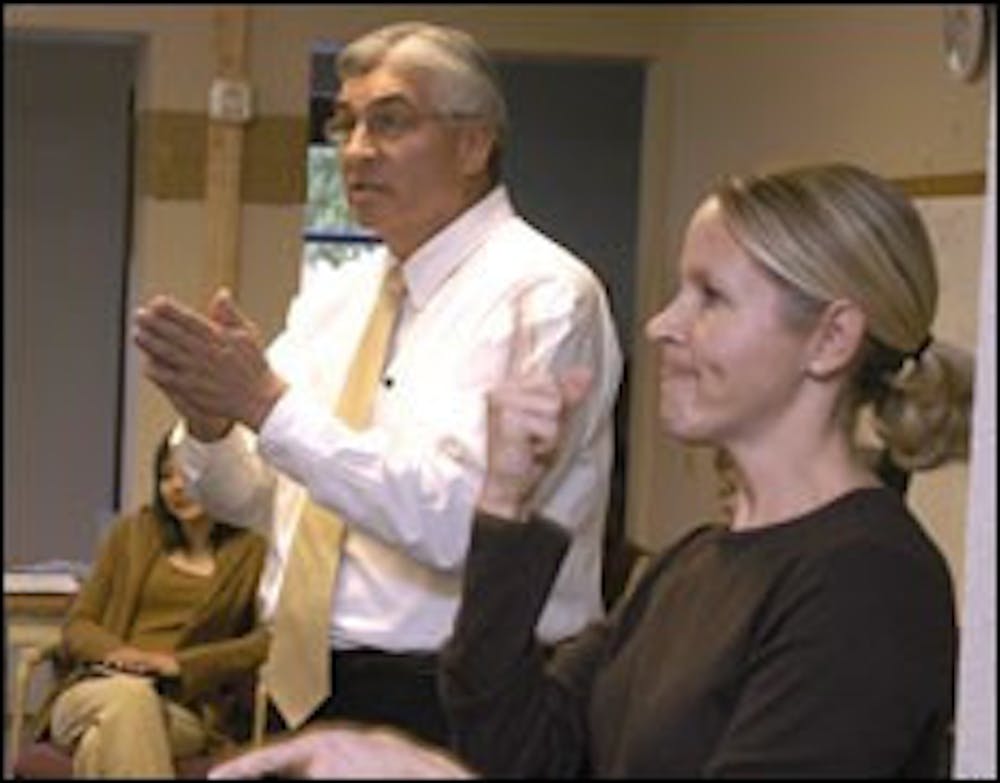Complaining of low pay, all ASU staff interpreters for the deaf planned a walkout for today, leaving deaf students across campus without a needed service.
Interpreters said ASU has not been offering competitive wages for their interpreting services for years.
On Oct. 29, ASU's staff interpreters sent a letter to the Disability Resource Center asking for higher pay for interpretation services. They asked that an answer be given to them in two weeks or the center and ASU would watch them walk out Nov. 15, today.
According to ASU interpreter Jason Porter, he and his co-workers receive about half the pay other interpreters around the Valley do.
In the letter the interpreters sent to the center, they proposed a new pay scale that took into account pay from other companies and the tuition waivers ASU offers to staff.
ASU pays about $21 per hour for its certified interpreters, Porter said. But a new company to the Valley offers about $38 per hour for certified interpreters.
"ASU will never get another interpreter if they don't up their wages and will lose the interpreters they already have," Porter said. "For the sake of the students and the interpreters that are here, changes need to be made."
On Friday, ASU administrators, interpreters and students discussed the complaint in a meeting.
No dollar figure was presented to the interpreters; instead, administration asked interpreters for more time, until all members of a budget committee could meet Tuesday.
Assistant director of the center Richard Jones said he worked with other staff members to plan a budget he believed the interpreters would be pleased with, but no changes could be made until the Tuesday meeting.
"[But] this University doesn't change overnight," Jones said.
At the end of the meeting Friday, Jones asked the interpreters if he could expect them to be in class today. Interpreter Jennifer Scarboro referred him to the letter ASU had received two weeks earlier. No answer had been given to the staff and they would not be in classes today, she said.
"[It is] as simple as a pay raise," Scarboro said. "We're not even asking for equal pay, we're asking for enough that we can survive and not have to take on an extra job. If we let it go two more days, it just continues the cycle. I hope I'm back on Wednesday."
Problems for ASU and the interpreting staff have come to a boiling point this fall, Porter said.
New Competition
Sorenson VRS, a company that offers same-time interpretation via television and computers, recently came to the Valley offering higher pay than other local companies and ASU.
"The pay rates [Sorenson VRS] offered increased others all over the Valley, but ASU did not," Porter said.
Robert Soza, associate vice president and dean of Student Life, also placed blame with the company, though he admitted he had known about its arrival for some time.
"The market has been tremendously skewed, turned upside down," Soza said. "Sorenson has been actively recruiting, aggressively recruiting our staff."
Due to the high pay rates elsewhere, ASU has lost two nine- and 10-year veteran interpreters, leaving those still at ASU to deal not only with low pay, but extra work to compensate, Porter said.
"Probably the two most valuable assets left because of the discrepancy, and they left in the middle of the semester," Porter said.
If the issue is left unresolved, it also could become a problem for the University, and not just for the students. Without adequate disability services, ASU could face legal problems.
"We have the legal responsibility of offering these services," Soza said during the meeting Friday.
In accordance with the Rehabilitation Act of 1973, ASU has an obligation to provide interpreting services to deaf and hard-of-hearing students.
Soza and interpreters said deaf students have filed complaints with the Arizona Attorney General and the U.S. Office for Civil Rights .
"If President [Michael] Crow or his administration refuses to expand the disability resources and provide adequate funding to keep the interpreters and the program competitive with outside markets, ASU will be opening itself up to major litigations like federal class action, for example," said Ian Park, interdisciplinary studies senior and a deaf student who uses the interpreting services. "Federal class action lawsuits would just turn off federal funding for ASU's expansion like a switch."
Caught in the middle
Park said he understands the reason for the walkout but hopes for a resolution soon.
"It's my future at ASU at stake," Park said.
Park said he has only nine classes left before he can graduate and he said a continued strike could affect his future at ASU.
"I have a future almost planned out and this issue would be just enough to change that almost completely," Park said.
Marisa Espinoza, also an interdisciplinary studies senior who uses the interpretation service in her classes, said that while the interpreters' absence will make it very difficult to succeed in class, she supports the their decision.
Jones said the center would call in freelancers to cover the shifts, but some classes may be left without interpreters, leaving students without a service they need daily. Jones said students also would rely on note-takers and added that their teachers also would be notified.
"It is just a terrible issue that has happened," he said.
Espinoza stressed the importance of finding a resolution quickly for deaf students.
"In the end, we are all the same," she said. "We are all getting an education, we want to get a good job and we want to be satisfied with our college experience."
Reach the reporter at rkost@asu.edu.




